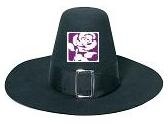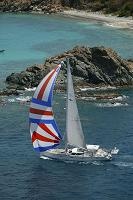Yo Ho Ho and a Bottle of...Lemonade

New Labour, New Puritanism
Mr Ladyman is
"...satisfied that in bringing in an alcohol limit for non-professional mariners and in setting the exclusion limit at 7 metres and 7 knots we are providing the best balance between improving safety and avoiding unnecessary regulation."
BBC News
Hmm, a NuLab Minister "avoiding unnecessary regulation", that's like a tramp avoiding a Wetherspoons pub, so even for those who might be inclined to see this as something approaching common sense (myself not included) this announcement deserves a second look.
I do have a personal interest in this. I used to go sailing on a fairly regular basis, and enjoyed every minute of it. I was introduced to it by a colleague at work who, in addition to doing good work with the London Sailing project for the young and disabled, organised a fair number of fairly boozy cruises usually over a long weekend. Sadly I haven't been for a while, but he's a top bloke so I can't really be anything but slightly jealous about the fact that he had the chance to move away to work full time in the nautical world, escaping the life of IT sales.
The general itinerary was to for a dozen of us to get down to Lymington straight after work on a Thursday, provision up some 34-42 foot yacht with food and beer, then head down to a local pub to wait for the tide to turn. With luck there would be time for a trip to the sub-continental food emporium to fill bellies with something better than what we could rustle up in the galley. The trip to the Indian usually raised the most eyebrows as the traditional "same again, to take away" was asked for at the same time as the bill; another meal sorted out. After that it would be into the oily blackness of the Solent, far from pissed, but we had certainly taken cabs to and from the town, being over the limit that Mr Ladyman proposes. Wind and tide permitting the sails would soon be up, the engine off, and seven knots comfortably exceeded perhaps reaching such breakneck speeds as 18mph.

Wait till you see it with
police stripes down the side
When we were afloat, those in charge knew what they were doing. and took it seriously, even if they had had a couple more pints than they would drive on. Many had prestigious levels of Yachtmaster qualifications, two were even Royal Navy professionals, but there is something unnerving about sharing a watch with people who's main job is keeping their particular class of vessel under water. Safety was paramount, was emphasised before every trip even before you got instructed on how to operate the
One person's experience should not though define what the law should be, even if it does seem to drive a lot of the current government's thinking. I'm sure Broon, as the local minister's son probably spent many of his school days with his head shoved down the toilet bowl, but that's still no excuse for the misery he is about to inflict on us soon. So let's look more objectively at Mr Ladyman's proposals, let's even assume their may be some types of alcohol related behaviour that should be restricted whilst in charge of a boat.
So, seven knots then, speed kills after all...doesn't it? Seven knots is roughly 8 miles per hour or in other words twice as fast as a brisk walking pace and little over half the pace of someone trying to set a four minute mile. Woah! better start thinking about the havoc someone running for the bus after a few pints could cause. If anyone from the Department of Health has Googled on to this site, due the number of references to their useless Ministers it now contains, this is is not a suggestion. An act restricting people to walking pace after a skinful is not in the public interest.
Small Catamarans - Not Covered
Now all of this could be construed as an argument for applying the same regulations to all sailing craft, and so it could be if it wasn't for the ridiculously prescriptive nature of the regulation, tying the limit as it does to the same one applied for driving a car at 60 miles an hour along a winding country road. The drink driving limit is predicated on a number of factors, including: the relationship between alcohol levels, reaction times and speed, the nature of the physical skills that may be impaired under the influence of alcohol, and the potential risks to someone who drives under the influence, passengers or others they may encounter. On all of these criteria, being in control of a boat does not merit the same restrictive approach as applied to driving a car. Decisions do not need to be taken in fractions of a second, but over several seconds where a vastly higher level of inebriation would be required to produce dangerous impairment. The chance of a drink impaired decision leading to a negative outcome is also vastly lower, as is how serious such an outcome is likely to be.
Was a law to be proposed that suggested an offshore offence akin to reckless endangerment (which may already apply or have a maritime equivalent for all I know), and were that law to allow for the level of inebriation, as evidenced by clear impairment of abilities, to be considered relevant evidence in determining guilt or sentencing the guilty, it would seem reasonable enough to me. A jury could rightly send a message to the CPS should they seek to prosecute a few young men who had been caught sailing a yacht of significant size, safely albeit with one pint over the drink driving level. They could send a very different message to a defendant who was clearly off his head as he took a 6.9 meter speedboat for a 30 knot spin round a busy harbour. To be honest I suspect legislation to this effect exists, but is simply not nit-picking and rigid enough for the minds of the current government and the Skoda minds of the British Civil Service.
It might even be permissive enough to allow people to have a little fun, which would never do, would it?
If you do want something to keep your tiny little minds occupied, maybe ponder on the way we allow people to hire small but fast sailing dingies on along every beach front, regardless of experience or qualifications. I bet quite a few incidents involve such rentals. I don't suggest a harsh licencing regime, but perhaps encouraging a greater duty of care on those who offer such rentals. Most dive shops won't hand over scuba gear unless you show you have at least basic qualifications and nor should they. I wonder how many incidents that exercise Mr Ladyman's mind did involve alcohol, but where the alcohol was a minor issue when set aside a lack of experience. I'd be happy to be on a boat with some of my experienced friends if they were off their faces, but know I wouldn't risk taking out other people myself stone cold sober. It's not the same as saying "he's a good driver, it's OK for him to drive drunk", it's a different and rarer skill set, one taken very seriously and in which there has never been an acceptance of excess among those who practice it.
As a final comment, I notice that the evidence presented by Ladyman for the need to introduce new rules does not consist of clear unambiguous statistics about current problems of people at sea after a few pints, nor even a couple of illustrative examples. The Marine Accident Investigation Branch is mentioned, but as a branch of officialdom I'd like to see the data, and to assume that they are likely to have put forward a fully balanced position is to take far too rosy a view of such people. How long do the police want to lock people up without charge again? What drink drive alcohol level would they prefer?
He also rolls out that old hoary chestnut, that he:
...considered submissions from MPs on behalf of their constituents "who have had personal experience of the tragic consequences of accidents involving vessels, where alcohol was thought to be a causal factor"
BBC News
Ah, that will be the usual 'bulging postbag' that they are so keen to keep even statistical data on secret, and is always rolled out when objective data may be thin on the ground.
Update 14th June, Early Hours: To answer the same question from 8 different e-mails at once, yes, it was hard not to use the word 'ladyboy' once in the whole of that posting.









No comments:
Post a Comment